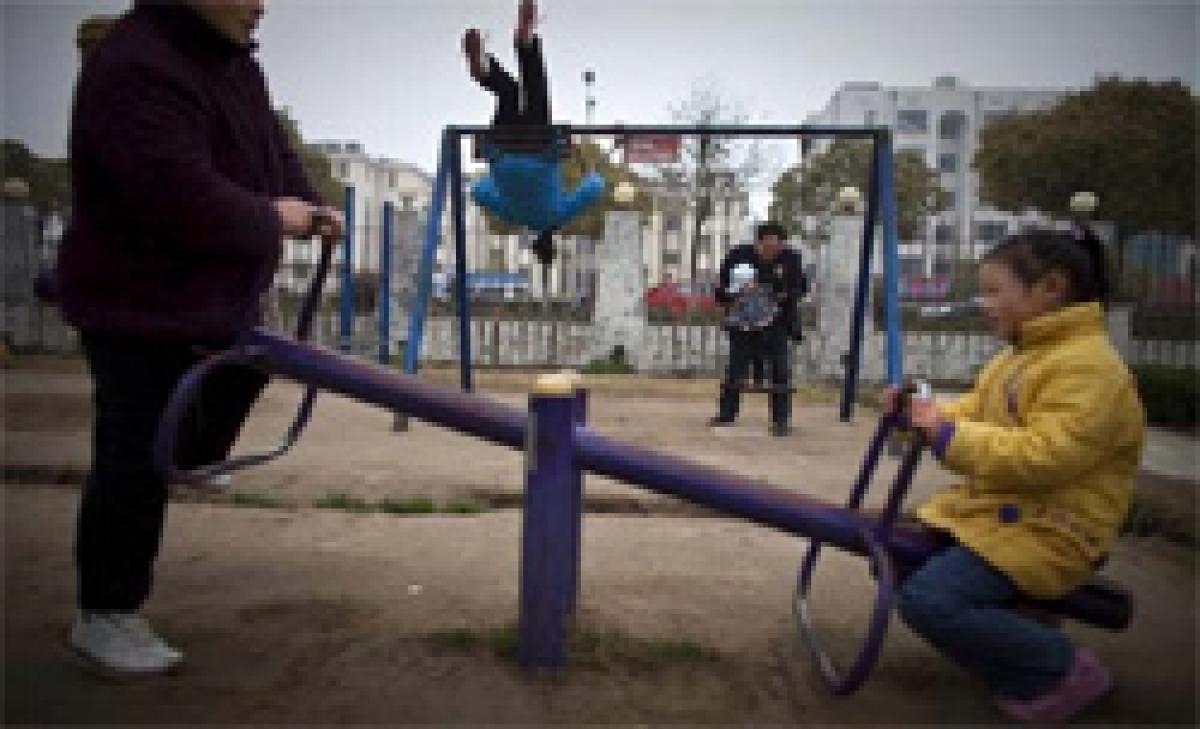Live
- ‘Get Set, Grow Summit 2024’ Focuses on Digital Detox for Families
- Stokes motivates his team to put in extra effort, says England pacer Potts
- From overcoming setbacks to leading India in U19 Women’s Asia Cup, Niki Prasad's amazing journey
- Driving Enterprise Security: Inside Venkata Reddy Thummala’s Leadership Journey
- Constitution debate: PM Modi hails 'Nari Shakti'; makes strong pitch for 'United Bharat’
- Abhijeet Bhardwaj: Revolutionizing Enterprise Analytics with Innovation and Expertise
- Bihar: Inquiry initiated against principal who went to buy veggies during school hours
- Press Sri Lankan Prez for release of Indian fishermen: TN Cong MP to EAM Jaishankar
- TN: DMK postpones executive meet due to heavy rains & Parliament session
- Porous silicon oxide electrodes can fix durability issues in batteries: Researchers
Just In

x
Highlights
China\'s decision to abolish its one-child policy is a boon to couples and to sellers of goods from formula to diapers to toys. And it might help defuse economic stresses caused by an aging population.
 China's decision to abolish its one-child policy is a boon to couples and to sellers of goods from formula to diapers to toys. And it might help defuse economic stresses caused by an aging population.
China's decision to abolish its one-child policy is a boon to couples and to sellers of goods from formula to diapers to toys. And it might help defuse economic stresses caused by an aging population.
The impact of the surprise change announced Thursday is expected to be gradual. But with incomes rising in the world's most populous country, even a small uptick in births could translate into higher demand from Chinese that could ripple around the world.
The decision to let all married couples have two children, ending a policy that limited many urban families to one, coincides with official efforts to encourage economic growth based on consumer spending.
Wei Guang, the father of an 8-year-old son, said he and his wife already were considering whether to have a second child, even though the cost was daunting. Wei said food, clothes, nannies, after-school lessons and other expenses can cost 100,000 yuan ($16,000) a year.
"We know the cost will be substantial," said Wei, 51, who works in media and whose wife is in her 30s. "But we can manage."
Citigroup researchers said they expect a 5 percent to 10 percent rise in Chinese births.
The one-child policy had been intended to conserve resources at a time when widespread poverty would have been worsened by unregulated population growth. The ruling Communist Party has said it led to 400 million fewer births. But that also caused China's average age to soar, prompting concern about whether a shrinking workforce could support a growing pool of retirees.
China already had one of Asia's highest median ages at 37.3 years in 2014, and that could rise to 40 by 2025, according to Media Eghbal of Euromonitor International, a research firm.
The size of China's working-age population ages 15 to 64 is set to decline starting next year, according to Eghbal. Euromonitor estimates that the workforce will shrink by 11 million people in 2015-20.
The latest change "is significant and likely a response to the pressures that have been building," said Eghbal.
Experts say it will take two decades for babies born under the relaxed policy to have a significant effect on the workforce. But an increase in births could begin providing a boost to the economy as soon as mid-2016.
"Having the birth rate go up will definitely stimulate the economy," said Seth Kaplowitz, a lecturer in finance at San Diego State University who worked in China's real estate industry in the late 2000s.
Kaplowitz predicted that an increase in babies will eventually provide a "whole new base of opportunity" for U.S. and other consumer products companies. A string of Chinese product safety scandals has helped boost demand for imported milk, food and baby care products, allowing foreign brands to charge premium prices.
On Thursday, shares of Mead Johnson Nutrition Co., which makes Enfamil and other baby formula, rose more than 3 percent. The company, based in Glenview, Illinois, derived more than half its revenue between July and September from Asia.
"China is an important market for us, and we will be carefully monitoring this latest policy adjustment," said Chris Perille, a company spokesman.
Jeremy Haft, an entrepreneur who does business in China, said the one-child policy damaged the country demographically but faster population growth brought on by the end of the policy is a business opportunity worth trillions of dollars over time.
"All these people will need to be fed, clothed, housed, healed, powered, transported, and networked," he said.
The birth limits that were enacted in 1979 dramatically changed the status of children in Chinese society. Even families with modest incomes lavish money on their "little emperors," paying for dance, music and English classes.
Su Weihua, the mother of an 8-year-old daughter in the southern city of in Guangzhou, said she was making plans to become pregnant next year. She already is thinking about how to pay for a second child.
"I think we may spend less on things like travelling, luxury goods, expensive new phones or a bigger house," said Su, 36.
More On

Next Story
More Stories
ADVERTISEMENT
© 2024 Hyderabad Media House Limited/The Hans India. All rights reserved. Powered by hocalwire.com







